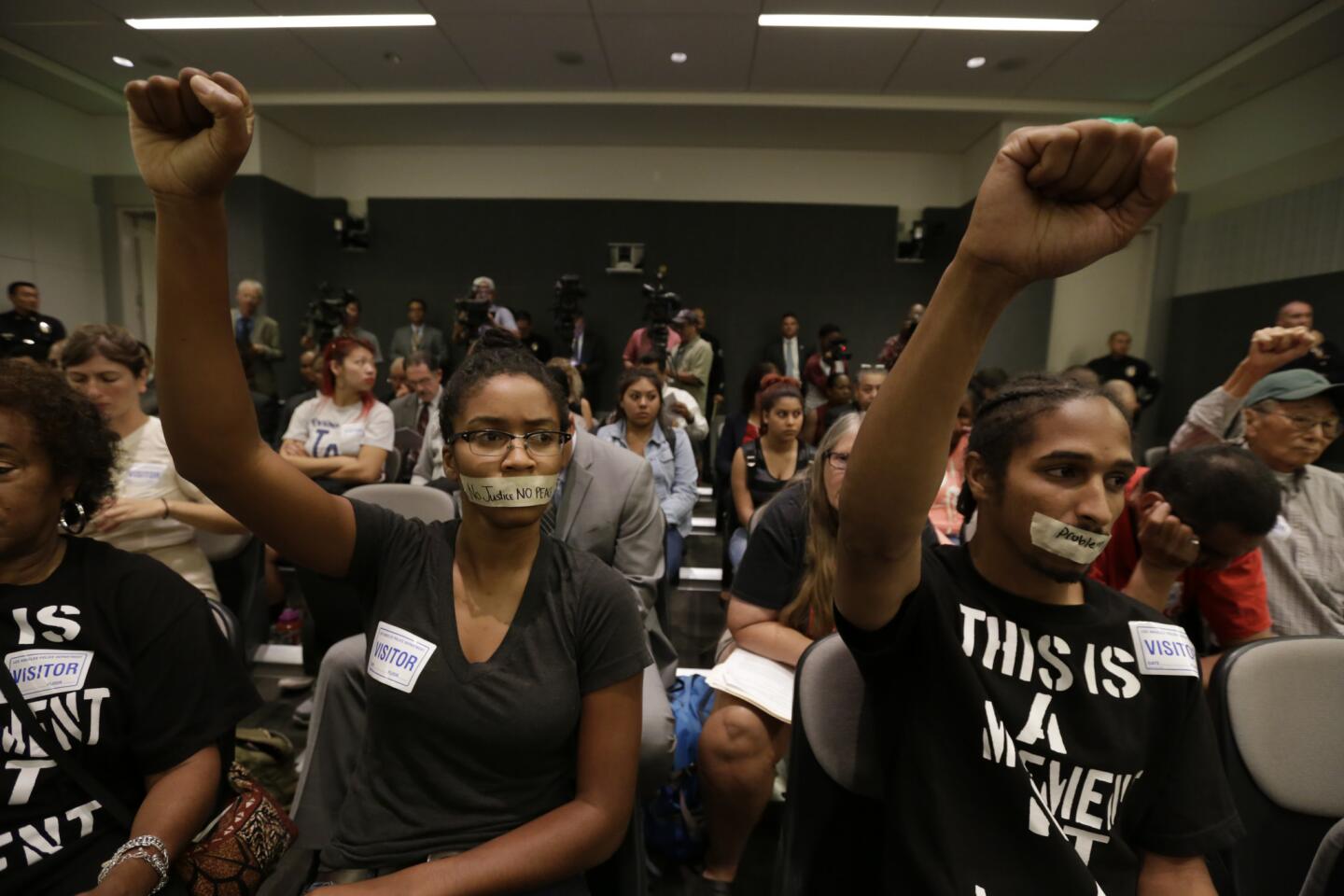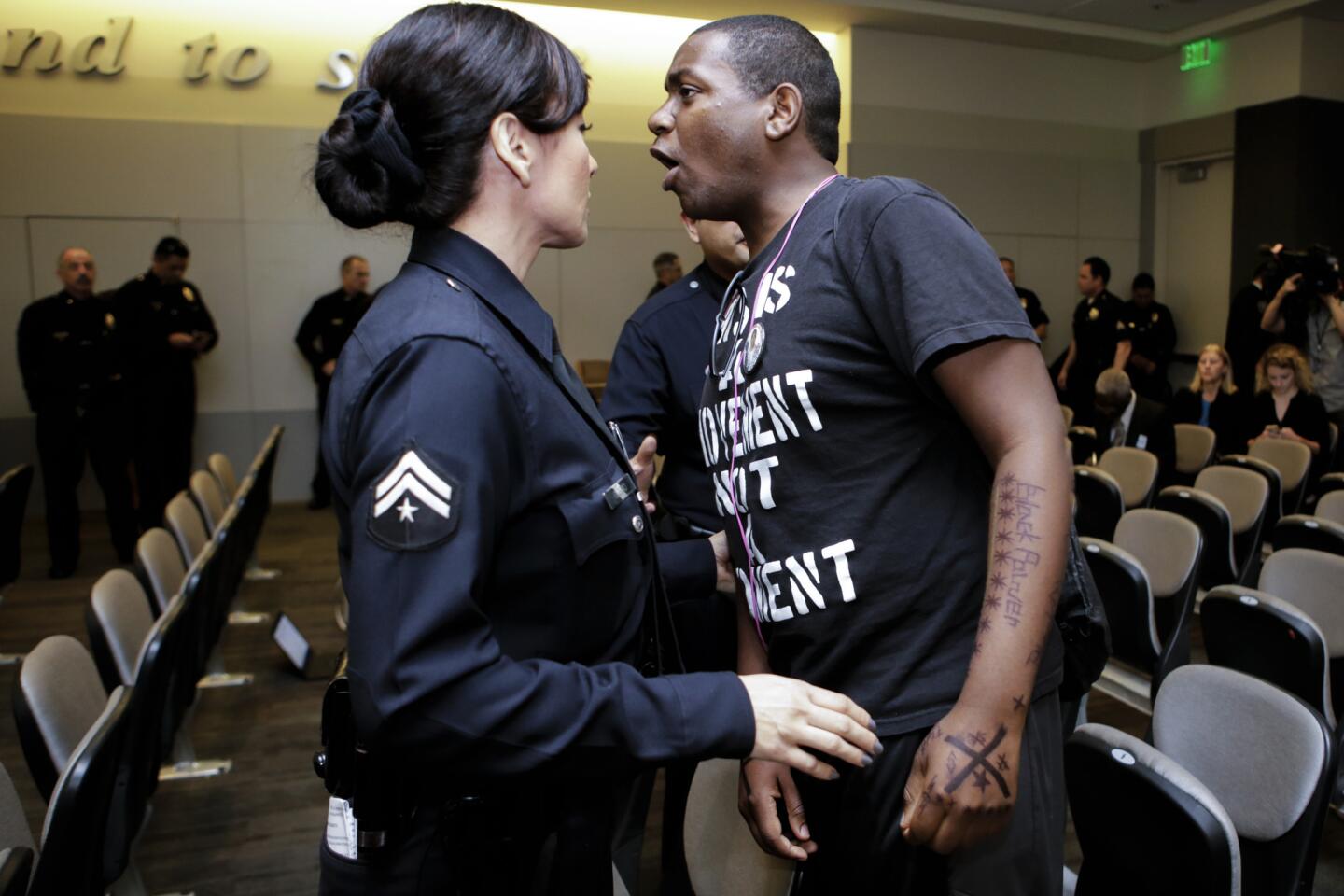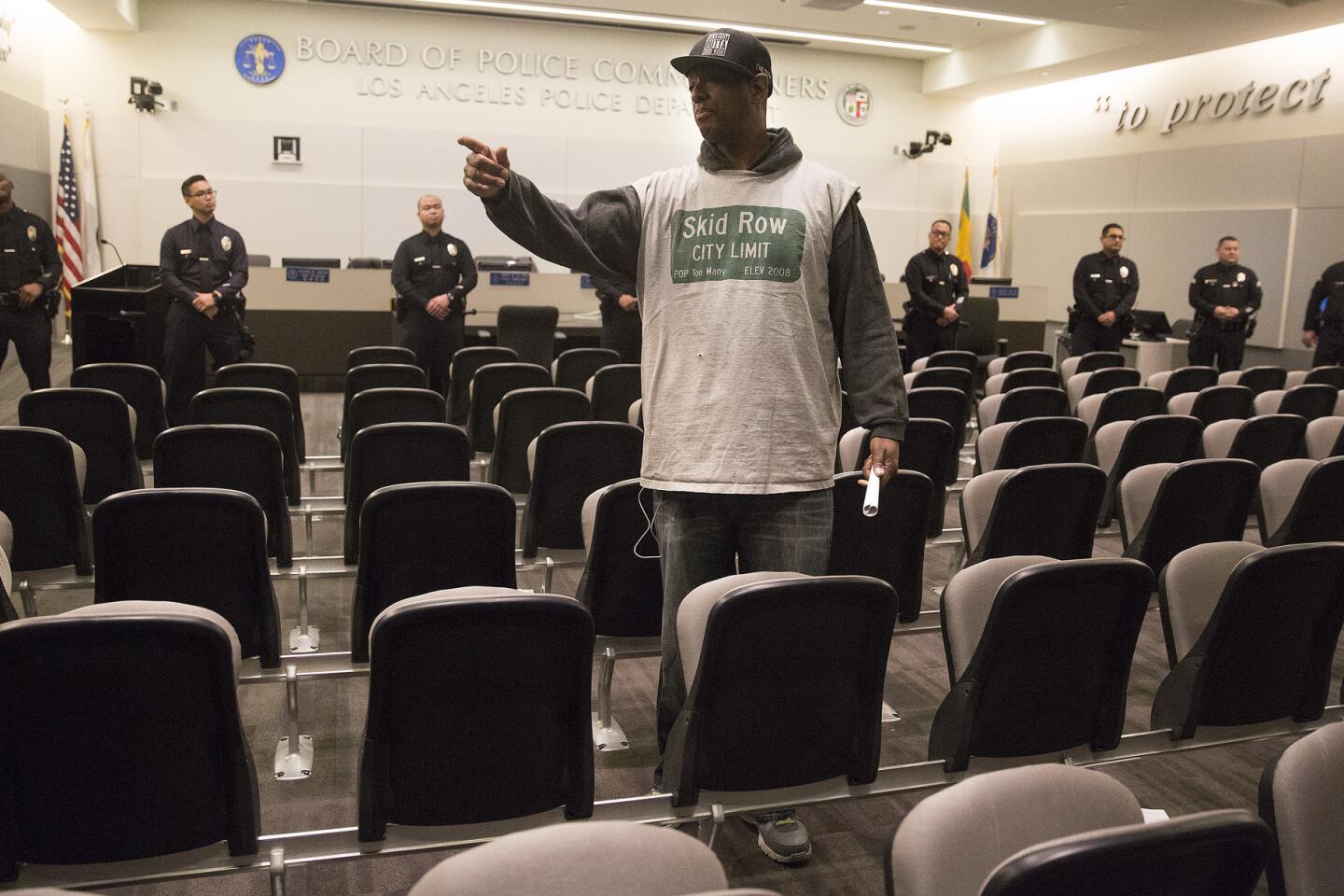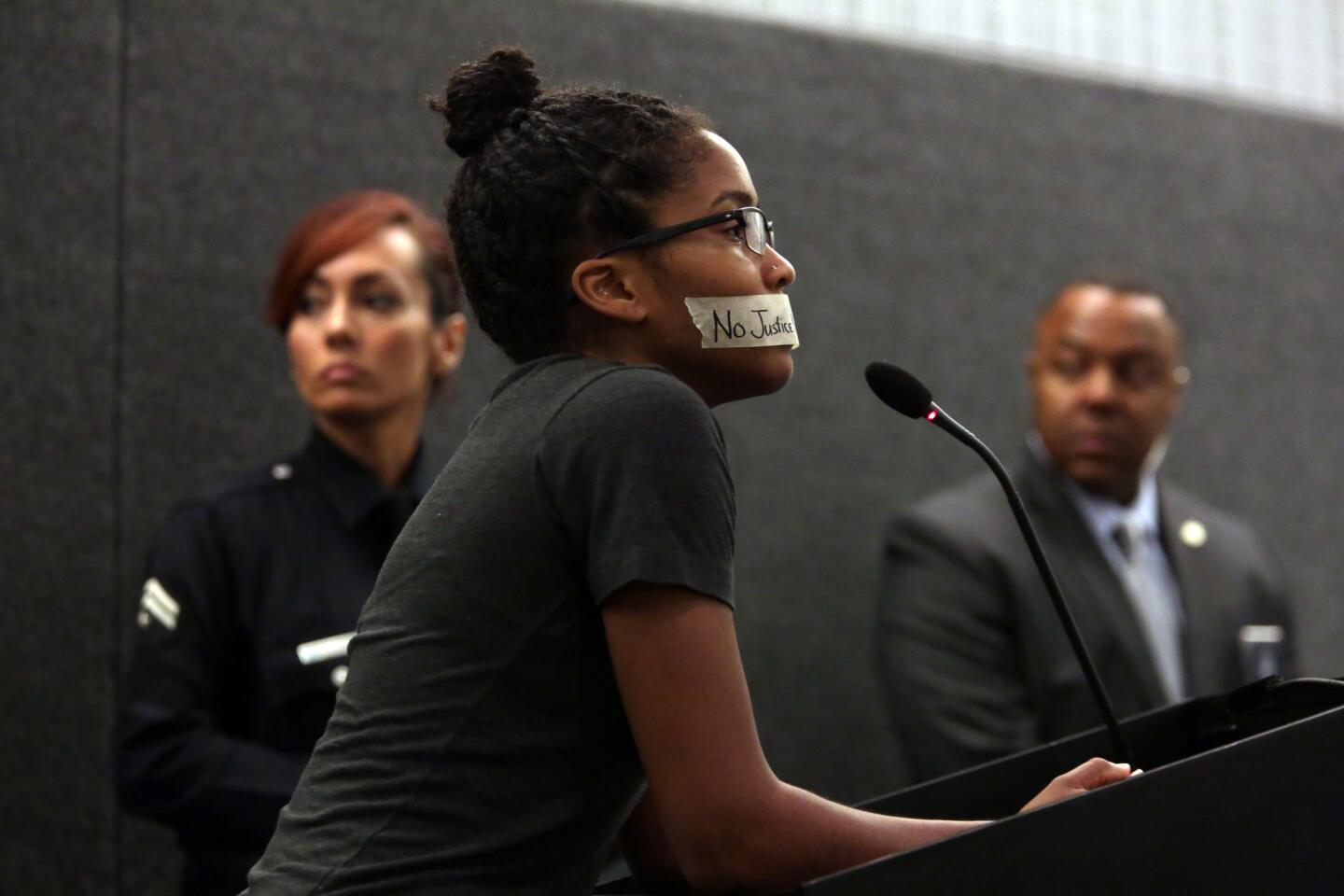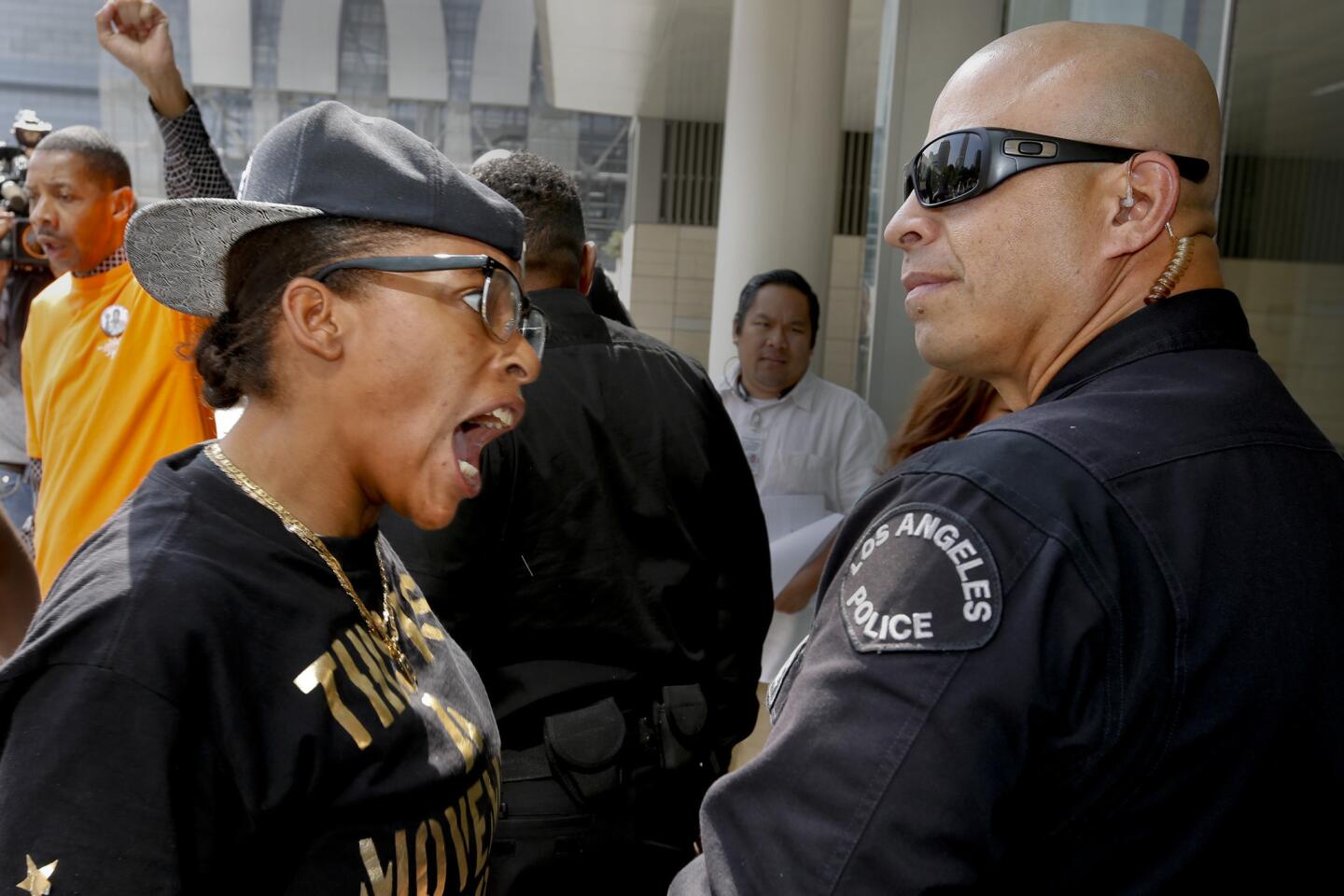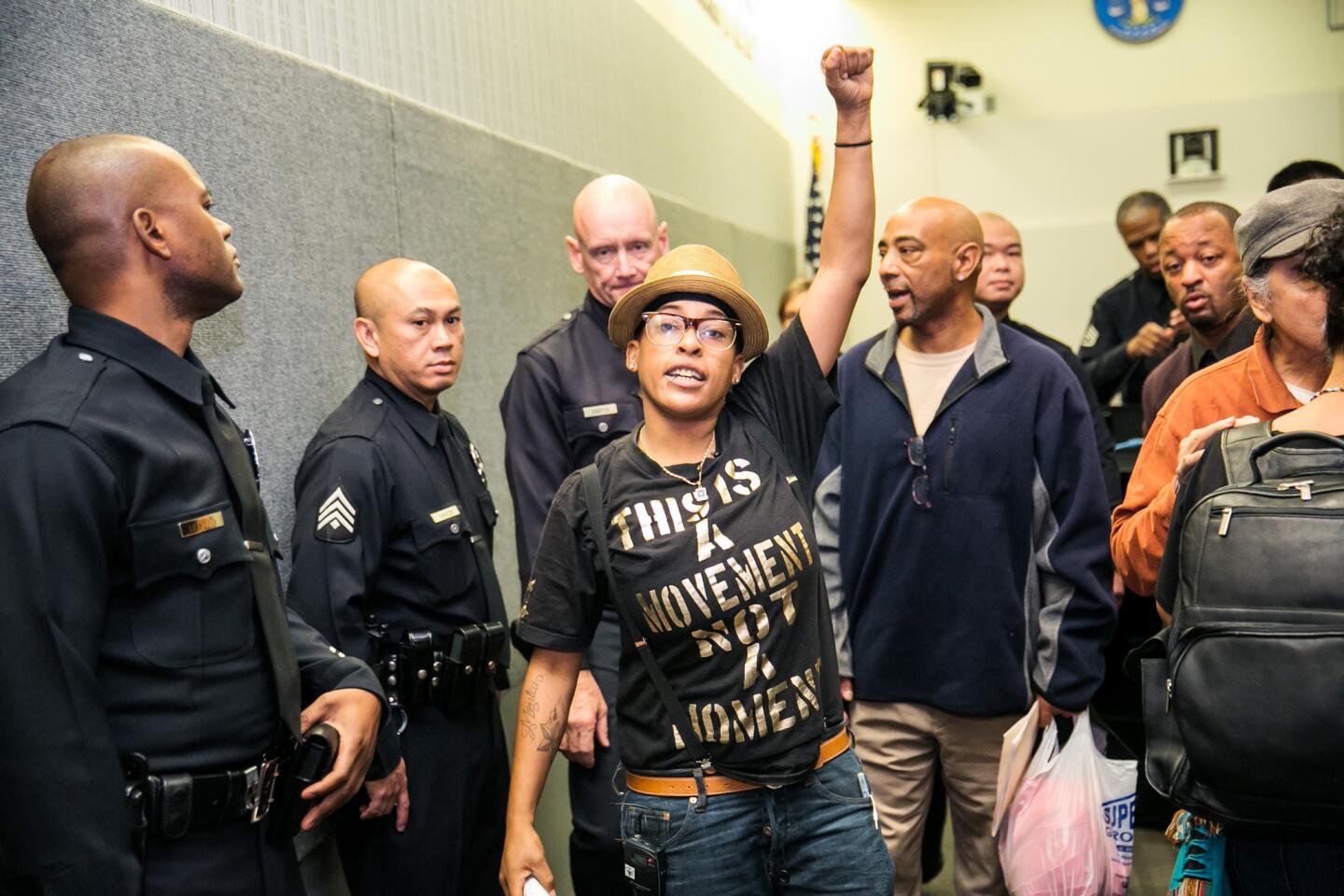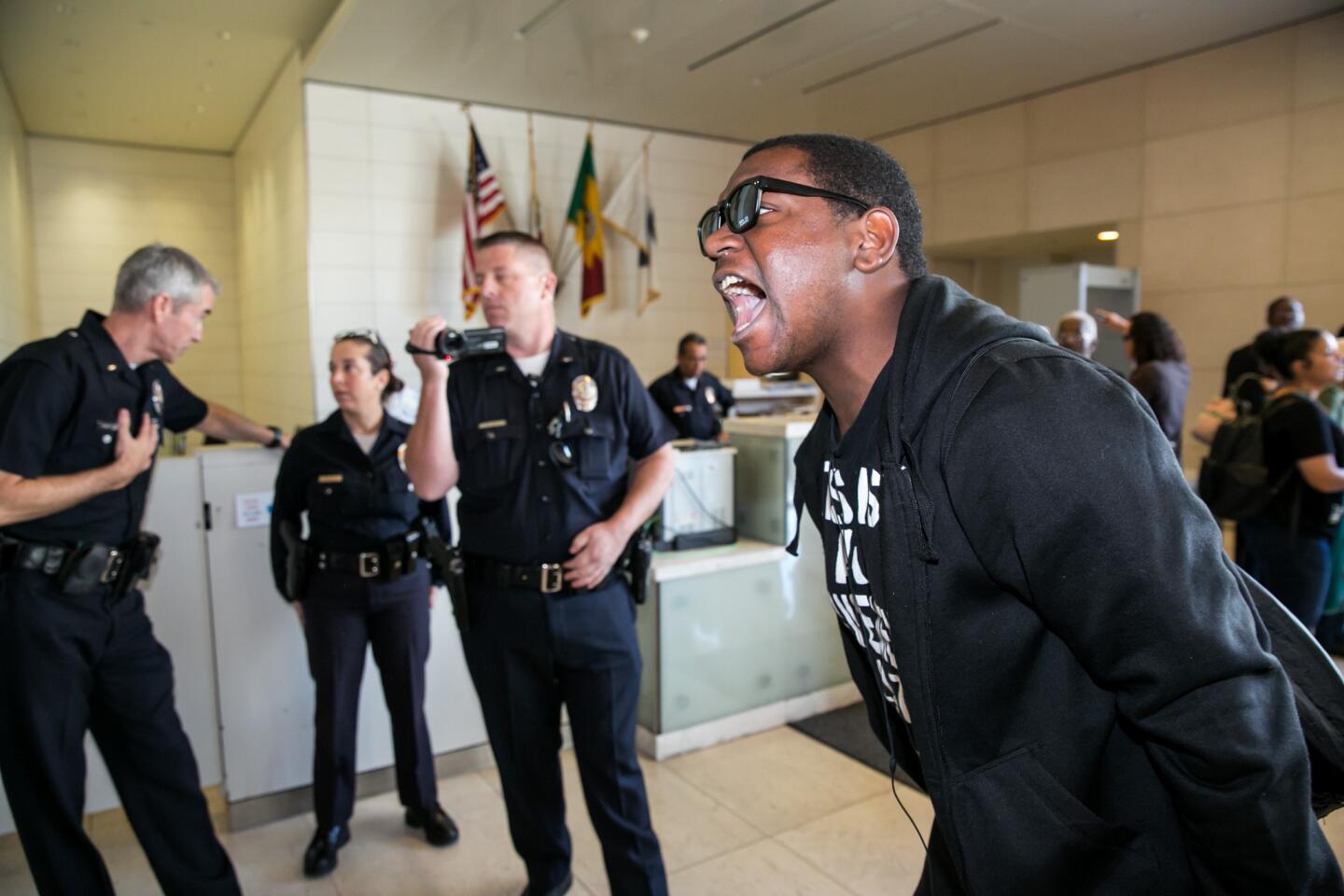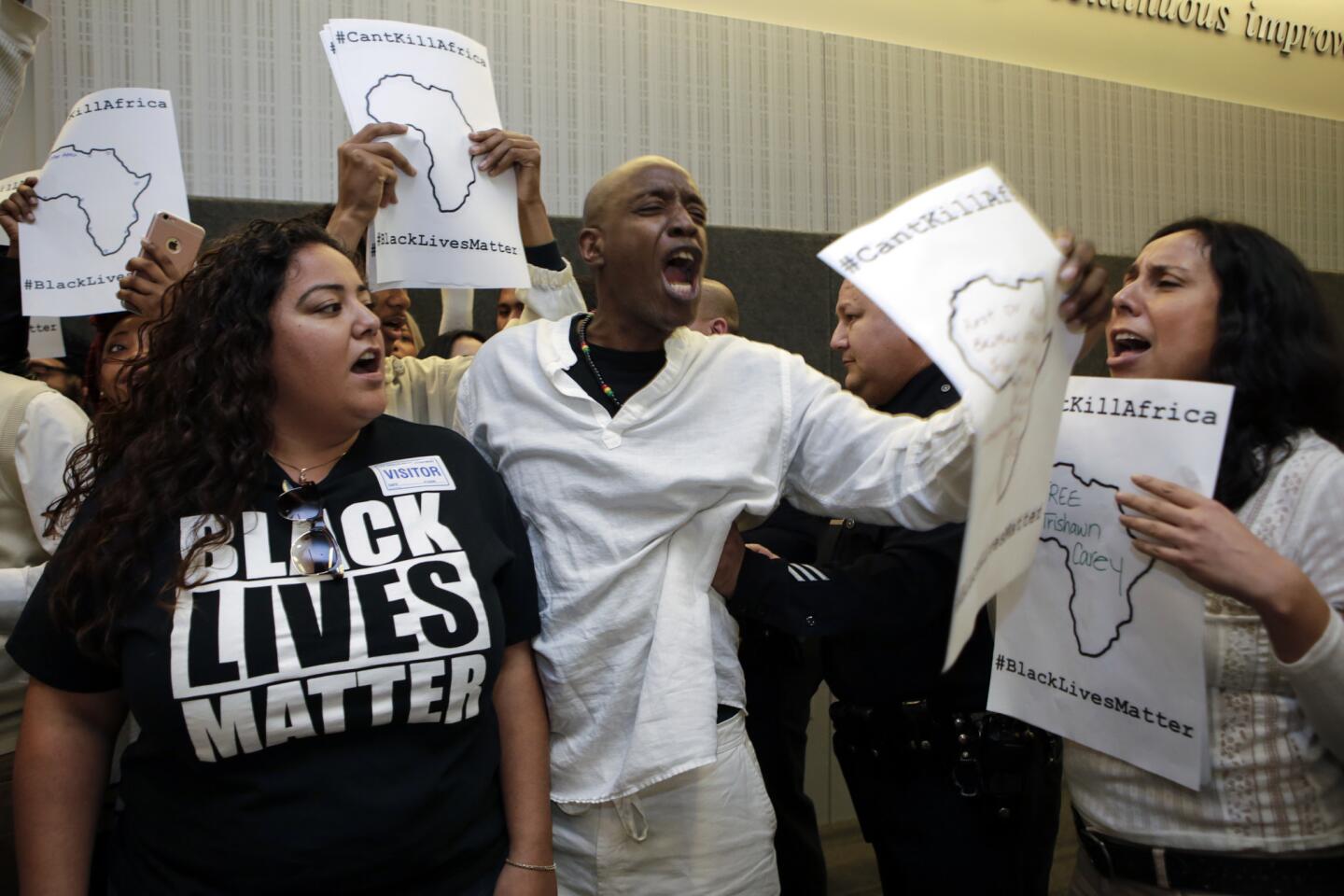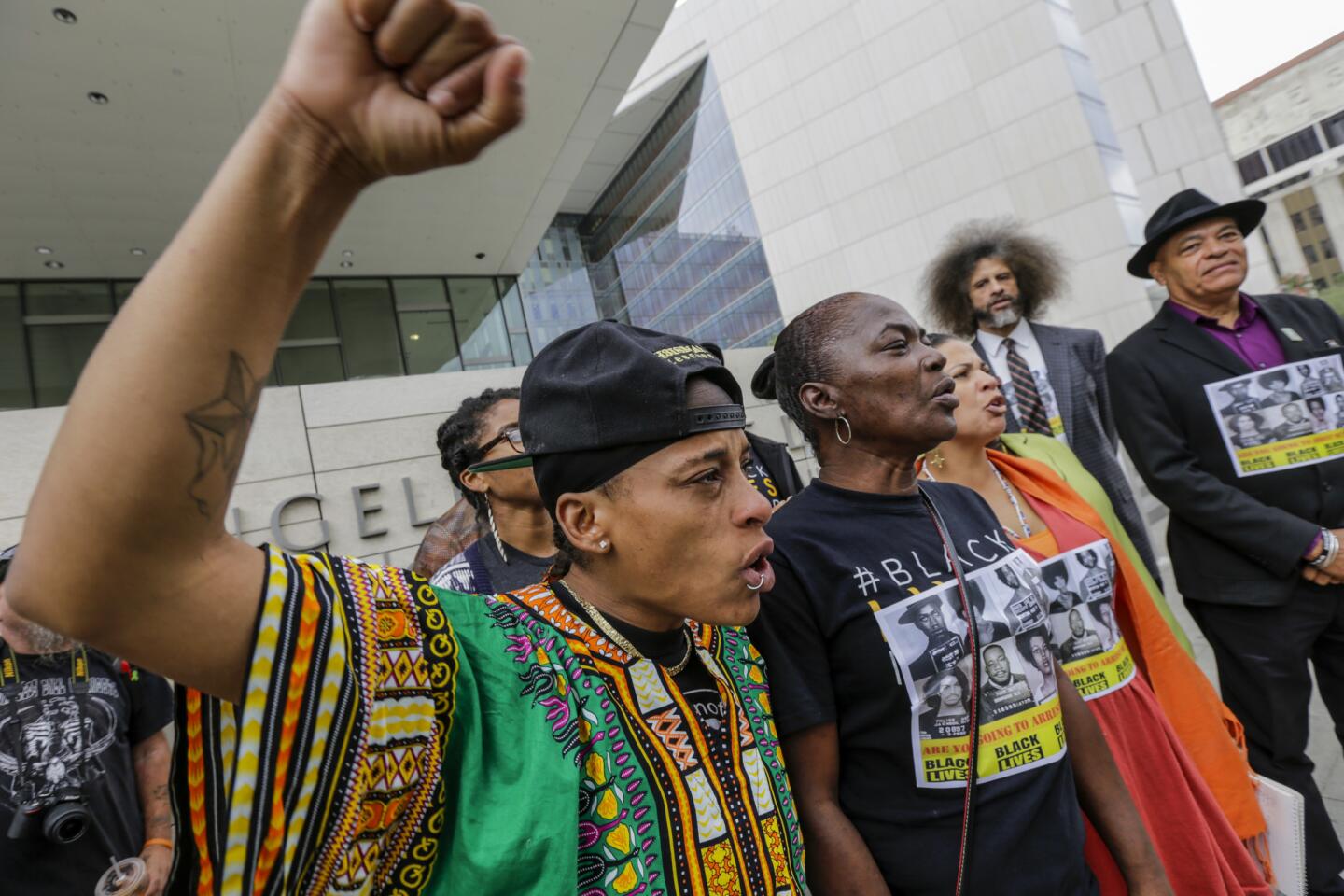Once-sedate L.A. Police Commission meetings upended by protesters set on disrupting business as usual
The Police Commission meeting had devolved into chaos.
Activists yelled at the five-person board as the commission’s president pounded a gavel, calling for calm. One commissioner looked close to tears. Another, Steve Soboroff, told a member of the audience to “shut up.”
“You can run, but you can’t ... hide,” an activist snapped as a Los Angeles police officer escorted him from the room.
“Are you threatening me, buddy?” Soboroff shot back.
The activist shouted a profanity at Soboroff just as the door closed. He was one of a handful of people removed from Tuesday’s meeting by police.
The flare-up was the latest in a series of verbal clashes that have boiled over in recent months and turned the once-mundane meetings into raucous weekly spectacles that some commissioners say hurt the board’s ability to have meaningful public debate about how to improve the LAPD.
Activists affiliated with the local Black Lives Matter movement have embraced disruption as a key strategy for keeping public attention on their concerns over policing and officers’ use of force, particularly against African Americans. Last year, eight out of the 38 people struck by LAPD gunfire — or 21% — were black. African Americans make up about 9% of the city’s population.
Protesters frequently interrupt the meetings, raising fists in the air as they chant the names of people killed by police. The board’s president, who is black, has been called, among other things, an “Uncle Tom” and “house Negro” — insults suggesting a betrayal of the black community. At least seven people have been arrested at the meetings since November.
The removals and arrests, the activists say, are attempts to stifle their criticism.
“It seems chaotic to others on the outside or folks who want 100% civil conversation, but when people, especially black people, are getting killed, there’s nothing civil about that conversation,” said General Jeff Page, a skid row activist. “You’re damn straight I’m going to speak out and holler and kick and scream, because I have a sense of urgency that something needs to change.”
Police commissioners, however, said they were already paying attention to those concerns and taking steps to address them. Arrests are only made, officials said, if members of the public become physical with police after being told to leave.
“I don’t have time for theater,” the commission’s president, Matt Johnson, said in an interview. “Every week I go into those meetings hoping to have a constructive dialogue. And every week I have been disappointed.”
Appointed by the mayor, the civilian police commissioners oversee the operations of the 10,000-officer LAPD, set department policies and evaluate the chief. In one of its most important roles, the board decides whether police shootings and other serious uses of force were appropriate — a responsibility that has come under greater scrutiny as police across the country have been received increasing criticism for how they use force.
Like most public meetings, commission meetings have long attracted some memorable attendees.
I don’t have time for theater. Every week I go into those meetings hoping to have a constructive dialogue. And every week I have been disappointed.
— Matt Johnson, president of the Police Commission
One man, who is black, frequently dons a red Ku Klux Klan outfit, similar to the garb he wore when he was ejected from another city meeting in 2011. (He then filed a lawsuit alleging the city violated his free speech rights, and settled for $215,000.) Another, who is white, wears a white hood marked with a swastika. One couple repeatedly warns of radio frequencies they believe harm the public and are being covered up by police.
After the fatal shooting by officers of a mentally ill black man in South L.A. in 2014, Black Lives Matter activists and others began attending the commission meetings in force, calling for the officers who killed Ezell Ford to be fired. Other police critics who regularly attended the meetings united with those organizers.
A core of about a dozen protesters typically attends the meetings, though the number fluctuates.
See the most-read stories this hour >>
John Mack, a prominent African American civil rights leader and former president of the Police Commission, said he believed community members should “keep the pressure” on the board and the LAPD to bring change to policing. Their anger is understandable, he said, given the LAPD’s strained history with the city’s black residents.
But he worries that attempts to reform the department are being stymied by a lack of real communication between activists and commissioners.
“You may have a legitimate message, but after a while your message gets lost if all you’re doing is in-your-face, berating people,” he said.
Activists have a list of demands, ranging from firing Chief Charlie Beck to defunding the LAPD. They have also rallied outside Mayor Eric Garcetti’s house and stormed the stage at a town hall meeting the mayor attended at a South L.A. church last year.
At the Police Commission meetings, tensions frequently flared last summer as protesters shouted criticism at the board or other attendees, prompting the panel to halt meetings and clear the room.
“Cowards,” the crowd chanted during one meeting as commissioners walked out.
Another week, when the meeting stopped and the activists moved outside the building, some recognized one of the police officers who had fatally shot a homeless man on skid row.
“Killer cop!” they shouted.
We’re not going to be silent. We’re going to stand up. And if it makes people uncomfortable, then it makes people uncomfortable.
— Melina Abdullah, a Cal State Los Angeles professor and prominent member of Black Lives Matter
In response, the commission adopted rules to “establish an appropriate level of safety and efficiency” at meetings. The rules allow the removal of attendees who repeatedly disrupt the meetings and warn that those who resist police could be subject to arrest.
“It’s when they cross the line, become physical with the officers — then they’re going to be arrested,” Beck said recently. “It’s not about speech. It’s about action.”
Beck is often a target for audience members, who routinely demand that he resign. They sometimes play an N.W.A song whose title is a curse of police into the microphone at the speaker’s podium.
But Johnson, an entertainment lawyer, has borne the brunt of the insults since joining the commission as president in September, despite having drawn praise from other African American civil rights advocates for his work on the panel. He is pushing the LAPD to reduce shootings by officers and revamp training and policies to emphasize the importance of trying to defuse tense encounters.
NEWSLETTER: Get essential California headlines delivered daily >>
“I agree that the issues are urgent,” he said. “I think the solutions that we are working on reflect the urgency and the seriousness.”
He has been booed and mocked at meetings. After he joined the board, a doctored image circulated on Twitter, showing Beck holding Johnson as if he were a puppet.
“Matt, you are a shame to the black community,” a black audience members said at a meeting in February.
Melina Abdullah, a Cal State Los Angeles professor and prominent member of Black Lives Matter, said the mayor’s appointees don’t represent the community.
“We’re not going to be silent,” she said. “We’re going to stand up. And if it makes people uncomfortable, then it makes people uncomfortable.”
Abdullah defended some of her comments to Johnson, including when she referred to him as a “house Negro” while reading from a Malcolm X speech. Abdullah, who is black, said the words were “not a slur as much as a call to be awakened.”
Johnson declined to comment on the racial remarks from the meetings but said board members needed to show restraint, just as they expect police officers to remain calm when insulted on the street.
Soboroff said the disruptions unnecessarily drag the meetings on for hours, taking time that the commissioners and LAPD brass could use to address other issues.
“We have business to do,” he said. “It is a waste of a lot of time.”
At the end of Tuesday’s meeting, a regular attendee accused Commissioner Kathleen Kim of not taking a strong enough stance on how police treat African Americans.
“I want to urge you to not make assumptions, assume anything about me,” Kim replied.
The activist started to respond as the crowd stirred. When Soboroff told someone to “shut up,” some in the crowd shouted profanities back.
Kim, visibly shaken, continued, describing herself as an “immigrant rights activist and scholar who has devoted her life and career to all of the issues that you’re talking about.”
A handful of audience members were warned to stop shouting and ultimately asked to leave.
By the end, the room was almost empty. Soboroff held his head in his hand. Robert Saltzman, a veteran commissioner, looked grim. Kim had already left the dais.
Later, she said she understood the important role that disruption has played in social justice movements but believed the tactic loses value when overused.
“Then the objective appears to be the destruction of the system — which is fine,” she said. “But my approach has always been to change the system rather than destroy it.”
For more LAPD news, follow me at @katemather
ALSO
Fatal shooting of unarmed black woman by police comes hours before San Francisco chief resigned
Lawmakers block effort to make child death records secret
Fighting Zika in a Silver Lake backyard: The hunt for the ‘cockroach of mosquitoes’
More to Read
Sign up for Essential California
The most important California stories and recommendations in your inbox every morning.
You may occasionally receive promotional content from the Los Angeles Times.
